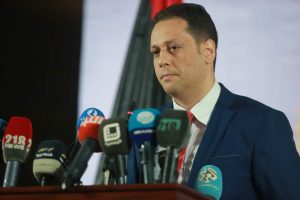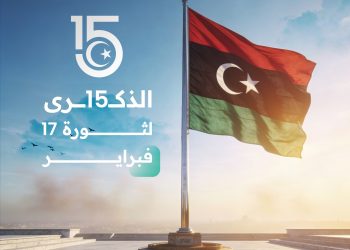By Sami Zaptia.

London, 11 December 2018:
Reviewing the recent overseas visits by Faiez Serraj, the head of the Pesidency Council and Government of National Accord, his personal spokesperson, Mohamed El Sallak, said that the visits came “in the context of communicating with brotherly and friendly countries, strengthening bilateral relations and developing cooperation at all political, economic and security levels”.
Sallak was speaking during yesterday’s weekly press conference held at the Media Centre of the Prime Minister’s Office and was referring to Serraj’s vsits last week to Jordan, Kuwait and Belgium.
Sallak reported that talks during Serraj’s visit also covered settling some outstanding issues in Jordan, in addition to settling Libya’s medical debts oin Jordanian clinics. With regards to Serraj’s visit to Kuwait, discussions included reconstruction with the Kuwait Development Fund.
Regarding his visit to Belgium, Sallak said Serraj held a meeting with the High Representative of the European Union’s Security and Foreign Affairs Policy, Federica Mogherini, where the Libyan political process, how it could be pushed forward and support for the plan of the UN envoy to Libya, were discussed.
On Serraj’s meeting with the Secretary-General of NATO, Jens Stoltenberg, capacity-building of Libya’s security and military agencies, the training of Libyan elements and the completion of the unification of Libya’s military, were discussed.
Serraj also met the US secretary of State Mike Pompeo, where he discussed the dossier on the fight against terrorism and ways to make progress in the Libyan political process and overcome the “obstructionists” and the completion of security arrangements to create the right atmosphere for holding parliamentary and presidential elections.
With regards to the electoral and constitutional process, Sallak confirmed Serraj’s support for the High National Electoral Commission (HNEC) for the completion of election and constitutional entitlements, and instructed the security and military authorities concerned to develop a comprehensive security plan to secure polling stations and conduct the electoral process.
Serraj’s comments regarding HNEC and election security come on the back of HNEC’S call last week for financial support and the provision of security as prerequisites for holding the referendum on Libya’s draft permanent constitution.
HNEC had announced last week that it was commencing preparations for holding the referendum – subject to conditions being met by January.
Sallak reiterated Serraj’s emphasis on the need for a constitutional referendum law consistent with the Skhirat Libyan Political Agreement Agreement (LPA) and legal regulations that do not make the referendum law vulnerable to legal appeals which would hinder the progress of this important constitutional entitlement.
Serraj also renewed his support for the all-inclusive National Conference forum to be held under the auspices of the United Nations early next year as an important event that will contribute to the achievement of presidential and parliamentary elections, which were supposed to take place (under the May Paris agreement) on 10 December.
However, Sallak said that the lack of commitment of one of the political parties concerned to its previous undertakings has prevented elections taking place.
Sallak was referring to the House of Representatives (HoR), which the Serraj government views as the obstructionist of Libya’s political process. UNSMIL head Ghassan Salame also referred to the HoR in a similar vein during his latest briefing to the UN Security Council.
The HoR, it will be recalled, only finally handed over the Referendum Law on Libya’s draft permanent constitution at the end of November, months later than had been agreed at the Paris May conference.
Moreover, many analysts believe that the Referendum Law is inherently flawed and will be challenged at the courts.
Critics of the HoR believe that the flaws were intentionally embedded by the HoR in the Referendum Law so that it fails to lead to a referendum, a permanent constitution and elections. They believe the HoR wants to maintain the status quo and want to keep Libya in its transitional state.
The HoR, for their part, consider Serraj, his Presidency Council, UNSMIL and international community as the obstructionist for failing to implement all the Skhirat LPA.
In their view, the Serraj government is under the influence of Islamists and militias in Tripoli and has failed to disband militias and create a unified regular army – as prescribed by the LPA.
With regards to Libyan investments and assets abroad, Sallak confirmed that Serraj was following-up on the matter closely in coordination with the Libyan Investment Authority and Libyan Audit Bureau , as well as closely following the progress of legal cases brought by the Libyan side in this regard.
Serraj’s comments on Libya’s frozen assets abroad come on the back of allegations that interest and profits from these some of these frozen assets held in Belgium have been paid out into other LIA accounts outside Belgium.
There have been calls by the HoR and Libyans in general for more transparency as to how these revenues are being used.
https://www.libyaherald.com/2018/12/06/hnec-commences-permanent-constitution-referendum-process/
https://www.libyaherald.com/2018/11/29/hor-hands-constitution-referendum-law-to-hnec/
https://www.libyaherald.com/2018/11/27/serraj-refers-lia-accounts-to-audit-bureau-and-international-audit-firm/
https://www.libyaherald.com/2018/11/12/lia-aware-of-interest-being-moved-out-of-belgium-but-assures-assets-still-frozen/
https://www.libyaherald.com/2018/11/09/salame-slams-hor-and-hsc-as-sterile-and-time-wasting/
https://www.libyaherald.com/2018/11/09/117901/






